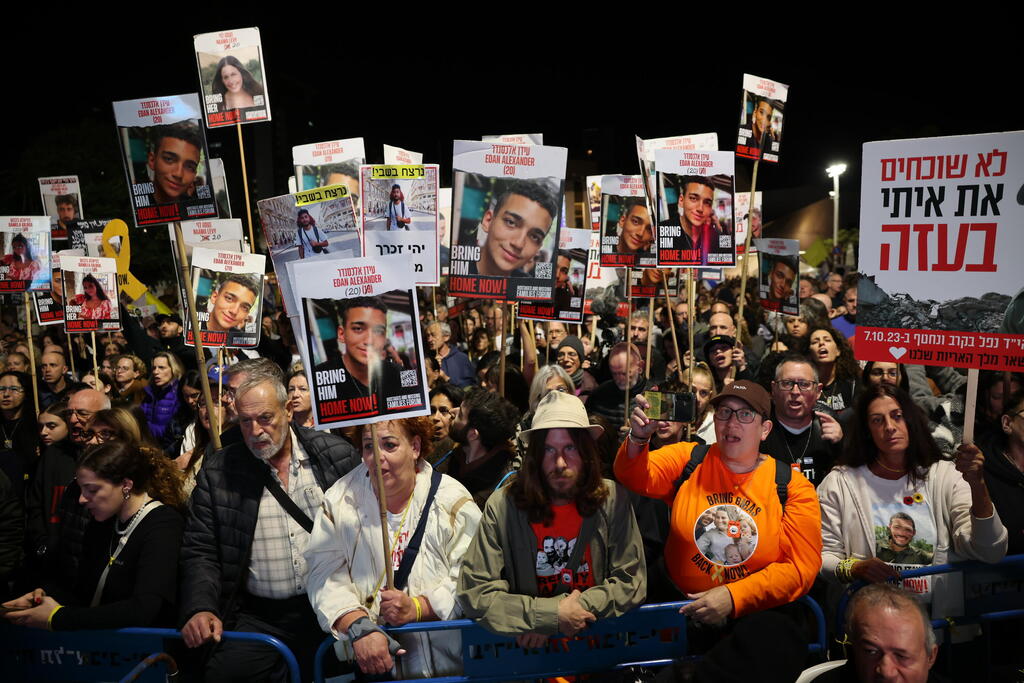Getting your Trinity Audio player ready...
There is "significant progress" in talks on a hostage deal that would bring many of them home from Gaza, the main points of which are currently being kept under the radar in order to prevent political interference that would thwart it, a senior Israeli official told Ynet Saturday night.
"The head of the Mossad and the head of the Shin Bet reported to the cabinet that Hamas is showing a willingness to reach a deal that has not existed before," the senior Israeli official explained, "and the assessment is that an agreement can be reached within a few weeks." This runs contrary to Arab reports of major difficulties in the negotiations.
The senior official claimed that what caused the change in the terrorist organization's position was "the blows they suffered" and the fact that Donald Trump will enter the White House in about a month. In the past, such events - and identical interpretations attached to them by political and security elements in Israel - have come to nothing.
The deal is reportedly expected to be implemented in phases, starting with the Biden administration and continuing into the Trump administration. The first phase will be humanitarian and will include the release of hostages in exchange for a seven-week cease-fire. The official explained that the parties currently are talking about a humanitarian deal for "an unknown number of kidnapped women, children and adults, in which each side reserves the option to return to fighting."
4 View gallery


Einav Zangauker, mother of hostage Matan, at a demonstration calling for the relsease of all the hostages
(Photo: Yariv Katz)
On Saturday, several of the families of hostages being held in Gaza protested this, claiming that such a "partial deal" would mean a death sentence for those who would be left behind. Einav Zangauker, mother of hostage Matan Zangauker, even claimed that Prime Minister Benjamin Netanyahu lied to her in their conversation last week, and that after speaking with members of the negotiation team, she realized that "he has no intention of returning Matan, but only a few hostages."
Such a deal could pave the way for both a deal that would end the war and a normalization deal between Israel and Saudi Arabia. However, at this stage, it is not yet clear whether Hamas will agree to a limited deal without ending the war, and there are several conflicting reports about it. On the one hand, there are reports of Hamas' flexibility and readiness for a limited IDF presence in Gaza, and on the other hand, there are reports that Israel has agreed to a temporary withdrawal from the Philadelphi Corridor, but these have not been confirmed. In Israel, they estimated last week that a deal could be reached within two weeks.
According to the senior official: "If Netanyahu brings a reasonable deal, he will have a majority in the government and the cabinet, even if (Public Security Minister Itamar) Ben-Gvir and (Finance Minister Bezalel) Smotrich oppose it and it is doubtful that they will support it. The right has many achievements, and this will make it possible to pass a deal. The problem is that this is Hamas, and we were at a similar point in the past, and in the end they torpedoed it then. That's why it's not over until it's over."
Meanwhile, U.S. President-elect Donald Trump's adviser on hostages and missing persons, Adam Boehler, 45, is expected to visit Israel this week. A source familiar with the details of the visit said that it was a private visit by Boehler, who is Jewish, to Israel, but Ynet learned that he will also hold meetings and consultations regarding the hostage deal in the Gaza Strip. Meanwhile, the Defense Minister's office has received a request to coordinate a meeting with Boehler, which will likely take place as early as Monday.
Opportunities in Lebanon and Syria
The Israeli official also referred to Israel's take over of the buffer zone on the Syrian border, explaining that Israel "will remain in the areas it has captured until the rebels stabilize the country." He said that "it does not appear that the rebels have any interest in entering into a conflict with Israel, but in the coming weeks and months we will see how they stabilize Syria. This is something big that holds a positive opportunity."
4 View gallery


Syrian rebel leader Ahmad al-Sharaa, formerly known as Abu Mohammed al-Golani
(Photo: Abdulaziz Ketaz / AFP)
On Saturday, rebel leader Ahmad al-Sharaa, formerly known as Abu Mohammed al-Golani, addressed Israel for the first time, saying that they were not seeking conflict - and also claimed that Israel no longer had a reason to interfere in what was happening in Syria. Shortly afterward, IDF Chief of Staff Herzi Halevi said that the IDF had no intention of intervening in Syria except to protect the border from extremist rebels. In the meantime, Hezbollah Secretary-General Naim Qassem admitted that his organization had "lost its supply route from Syria," and at the same time called on the rebels "to see Israel as an enemy and not to normalize relations with it."
Get the Ynetnews app on your smartphone: Google Play: https://bit.ly/4eJ37pE | Apple App Store: https://bit.ly/3ZL7iNv
In this context, the Israeli official also referred to Lebanon, saying that "the cease-fire is holding, and Hezbollah is left without a supply of weapons. Here too, there is an opportunity for Lebanon to regain control of the country."
Qassem also noted in his speech that one of Hezbollah's goals is to "strengthen the Lebanese army," but this is a smokescreen: in reality, the West sees the local army as an alternative to the military power of the terrorist organization, which has grown in recent years to enormous proportions that terrorized the towns and cities of the north for most of the months of the war. Now, the intention is to work to push Hezbollah further away from the Litani River, as far as possible from the border with Israel, so that the only armed forces in the border area will be the Lebanese security forces.





